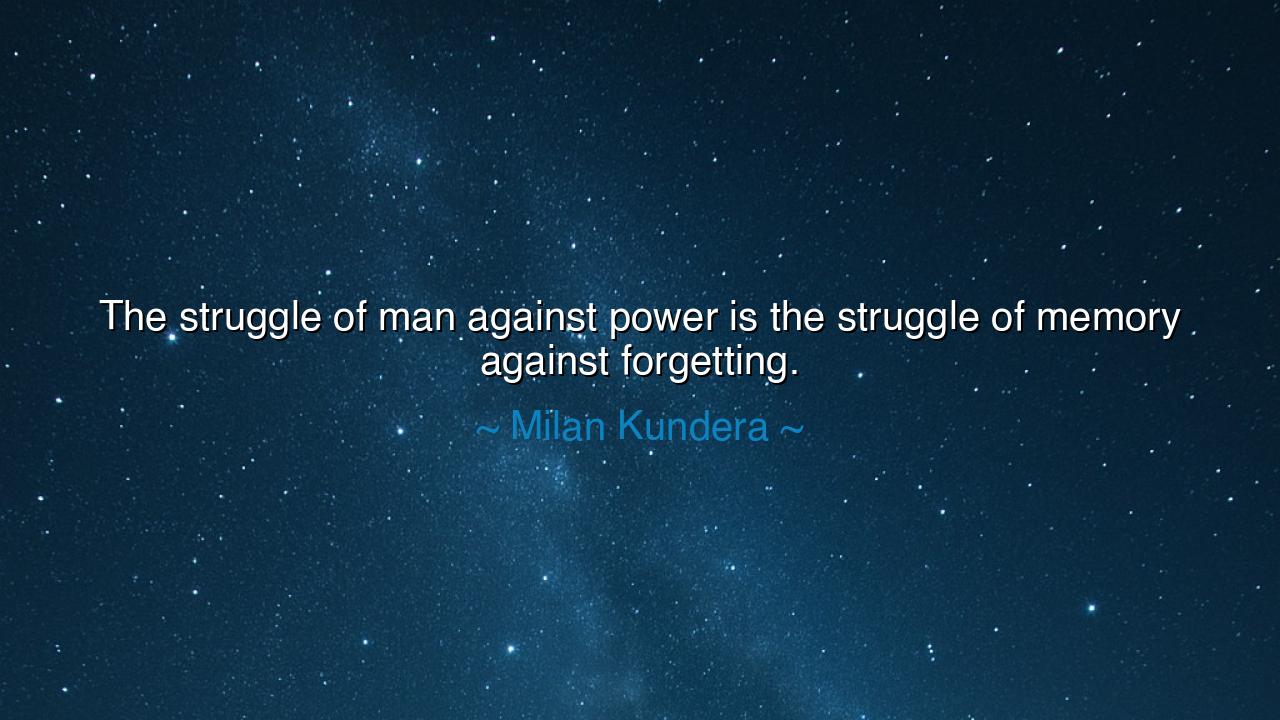
The struggle of man against power is the struggle of memory






Hearken, O children of time, to the voice of Milan Kundera, who whispers a truth both bitter and eternal: that the struggle of man is not only with swords or armies, but with the invisible chains of power, and its insidious companion, forgetting. To resist tyranny, to endure oppression, is to fight for the very essence of memory, to safeguard the stories, faces, and truths that authority would bury beneath silence and shadow. In this, the soul of humanity is tested, and its courage revealed.
For memory is the fortress against erasure. When a ruler or regime bends history to its will, it seeks not merely to command bodies, but to erase the past, to shape minds by removing the record of injustice. Kundera teaches that to remember is to resist; every act of recollection, every whisper of what has been, is a dagger against the oblivion that power imposes. Those who forget are vulnerable, their chains unseen, their liberties fragile.
Consider the courage of the Holocaust survivors, who, despite unspeakable horrors, preserved the memory of lives lost, of cities destroyed, of atrocities committed. Through memoirs, testimonies, and the tireless act of telling, they ensured that the world would not forget. In this preservation, they performed a sacred struggle, standing against the might of forgetfulness, even when the world around them sought comfort in denial. Their memory became resistance incarnate.
Yet, Kundera’s lesson stretches beyond the chronicles of history. Every whisper of injustice, every erased story, every silenced voice calls for vigilance. The struggle of man against power is both collective and intimate: it is the historian recording truth, the poet chronicling sorrow, the witness refusing to bow to lies. To resist is to remember; to remember is to live defiantly, in honor of those who came before and those yet to come.
Therefore, O seeker of wisdom, let this teaching be carried in your heart: forgetting is the ally of oppression, memory the shield of freedom. In your life, in your words, in the care with which you preserve and pass down knowledge, you partake in the eternal struggle Kundera immortalized. To remember is to resist; to resist is to honor the human spirit, unbroken, unyielding, luminous through the ages.
If you wish, I can also craft a visual, ancient-scroll-style layout for this passage to evoke the weight of timeless memory Kundera speaks of.






BCBui Cuong
Kundera’s insight feels especially relevant today, in an age of constant information flow. The struggle between remembering and forgetting is more complicated than ever. We are flooded with so much data that it’s easy to lose sight of what truly matters. Does the abundance of information lead to collective amnesia? Maybe the real danger now isn’t censorship, but distraction—forgetting not because we are forced to, but because we no longer pay attention.
DHDo Hoang
This quote makes me think about how fragile collective memory really is. It’s not just about remembering events—it’s about preserving identity and truth. I find it unsettling that power can manipulate what is remembered and what is erased. Does that mean that forgetting, whether deliberate or accidental, is a form of surrender? How can individuals or societies ensure that truth endures beyond those who seek to bury it?
ABAkiko BeNeko
Kundera’s words strike at the heart of how history and power intertwine. The idea that memory itself is a form of resistance fascinates me. It makes me wonder: how do we protect truth when those in power attempt to rewrite it? Are museums, books, and personal testimonies enough to preserve it? Or does every generation risk losing the lessons of the past to the convenience of selective forgetting?
KKKiet Khang
This quote from Milan Kundera is hauntingly powerful. It suggests that those in power often seek control not just through laws or authority, but by erasing or rewriting collective memory. I can’t help but think about how this applies to modern politics and media. How much of what we believe is shaped by what we’re allowed—or encouraged—to remember? Is forgetting sometimes intentional, a tool for control as much as survival?